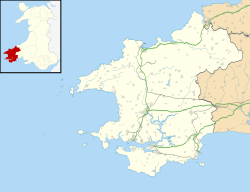Little Newcastle
| |
|---|---|
Location within Pembrokeshire | |
| OS grid reference | SM980290 |
| Community | |
| Principal area | |
| Country | Wales |
| Sovereign state | United Kingdom |
| Post town | Haverfordwest |
| Postcode district | SA62 |
| Dialling code | 01348 |
| Police | Dyfed-Powys |
| Fire | Mid and West Wales |
| Ambulance | Welsh |
| UK Parliament | |
| Senedd Cymru – Welsh Parliament |
|

Little Newcastle (Welsh : Casnewydd-bach) is a village, parish [1] and former civil parish [2] in the community of Puncheston in Pembrokeshire, Wales. A map of 1578 shows the parish as Newcastle. [3]


